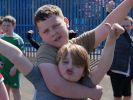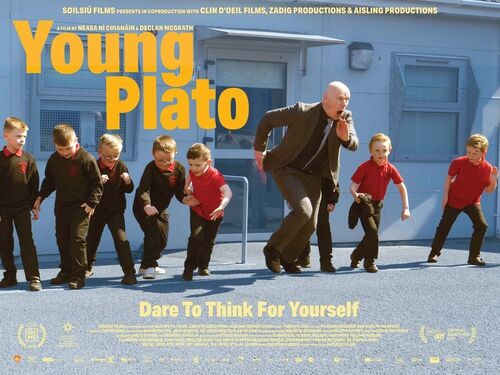Eye For Film >> Movies >> Young Plato (2021) Film Review
Young Plato
Reviewed by: Amber Wilkinson

Declan McGrath, Neasa Ní Chianáin's documentary steps into the classrooms of the Holy Cross Boys Primary School in Ardoyne, Belfast, to explore not just the school's philosophy when it comes to teaching kids who still live in the shadow of 'peace walls' or 'interfaces' but the way that it is using philosophical concepts to challenge their approach to life and others. It would make a great double bill with Kenneth Branagh's recent Belfast - which is also a largely child's eye view, focused on the start of The Troubles - as it explores the legacy that continues to impact the community today.
I was reminded of a moment in Branagh’s film when the kids are talking about how they can know if a kid is Protestant or Catholic. One says, "You have to get taught it" – and here it’s the idea of exploring similarity and common ground rather than difference, which is at the forefront of the ethos of the school run by Kevin McArevey and, as we see in the film, populated by teachers who are constantly looking for ways to reinforce positive behaviour and critical thinking.

The directors adopt an observational stance as they watch Elvis fan and classroom Kevin tackle his day with the sort of energy The King would be proud of - beginning with him singing along the pertinent line "there must be peace and understanding sometime" from Presley's If I Can Dream. Firm but fun, McArevey happily introduces the kids to concept mapping and a Socratic Circle as he probes ideas like whether it's ever okay to take your anger out on someone else, fostering inclusivity and coping strategies in the face of stress or anxiety.
The documentarians - who might as well be desks given how invisible they are - don't need to lean into the history of the area, some of it is still written on the walls and a bomb scare near the start of the film comes as a reminder that tensions remain. Brief intercut footage from two decades ago, showing young girls on their way to the primary's sister school being abused by loyalists, gives a sense of the parents' lived experience and how that, in turn, may have shaped their own mindset and that of their children. The filmmakers are also sensitive in their approach, so that although naked emotions are here, they don't intrude into the specific personal lives of the children.
McArevey takes a head-on approach, encouraging questioning and making the kids really work through their ideas - all of which are welcomed. While this is often applied to concepts, such as anger or the possibility of time travel, there's also real world application, including making them articulate their feelings - not just verbally, but on a whiteboard, if they get into a schoolyard scrap. Remorse generated this way also becomes a tool for a better approach and understanding not just of others but of the children's own triggers and how to better cope with them. This isn't just about big concepts and whiteboards but the everyday positive reinforcement that helps kids get on in all senses of the phrase. A hopeful, heartening film that features plenty of observations from the children that put adults to shame. "We all bleed the same," notes one, while another says, "We should all just be normal" - no wonder we see them teach their parents a thing or two and nearly everyone who watches this is likely to come away with a new strategy that could have application in their own lives.
Reviewed on: 11 Mar 2022

















